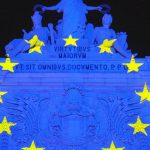Portugal spells out priorities for six month EU presidency
Portugal took the helm of the European Union’s rotating six months presidency on 1 Jan for the fourth time since it joined the European Union in 1986.
It laid out its priorities for the presidency which runs until the end of June and has no doubt breathed a sigh of relief that the EU’s trade deal with the United Kingdom was dealt with under Germany’s presidency which ended on the 31 December.
That said, it has plenty on its plate to deal with for the coming term such as kick-starting the economic Recovery and Resiliency Plans (RRP) for the Member States which will top the agenda.
The slogan for Portugal’s presidency is ‘Time to act: for a fair, green and digital recovery’ at a time dominated by a drive for economic recovery after last year’s partial economic lockdown as a result of the worst pandemic to hit Western Europe since the 1918 Spanish flu pandemic which followed World War I and killed 50 million worldwide.
The first official engagement of Portugal’s presidency began on 1 January with a visit from the president of the European Council to Lisbon, Charles Michel on 5 January.
However, the entire six months ahead has already been planned down to the smallest detail and will be the third Portuguese presidency at which Portugal’s foreign minister, Augusto Santos Silva will be involved as Secretary of State for European Affairs.
The first major event will be the visit from the College of Commissioners (the president of the European commission and respective commissioners) on 14 and 15 January, with the various ministerial meetings of the different sectors starting a week later, with a meeting of the EU finance ministers Eurogroup 2021 on 18 January.
December was a pivotal month for the future of the European Union when on 10 December the European leaders reached an agreement on the Multi-annual Financial Framework 2021-2027 and the European Recovery Fund (#NextgenerationEU). On 24 December the European Commission reached an agreement with the UK while on the 27 December the vaccination process in the 27 Member States officially began.
The Portuguese presidency will be responsible for starting a new cycle whose main responsibility will be to put in place the instruments and measures to end the pandemic and begin European economic recovery.
More specifically, Portugal has the challenge of getting all of the regulations put before the European Council and European Parliament approved and the programmes launched.
This will include the €750Bn European recovery fund, the financial bazooka specifically created because of the pandemic. The most difficult agreement, i.e., persuading Hungary and Poland to the economic rescue package, was achieved by the German presidency, but Portugal will have to coordinate the next steps with the European Commission – the approval of the RRP which will be evaluated by Brussels – with the first tranche (10%) of aid being paid out.
The Commission will also have to complete legal preparations to take on more loans on the financial markets in the name of the EU.
The three tasks, vaccination, economic aid and the RRP would have been the priorities of whichever EU Member State took the helm at the EU for the presidency, but Portugal also has its own specific programme for the rotating presidency.
One priority will be the implementation of the European Pillar of Social Rights which is about delivering new and more effective rights for citizens, built upon 20 key principles and involving equal opportunities and access to the labour market, fair working conditions, social protection and inclusion.
Portugal’s efforts will be visible at the two-day Social Summit on 7 and 8 May in Porto. The topics on the table will be an across-the-board minimum salary in the European Union and attendant rights on health, children, young people and the elderly.
Another theme embraced by the Portuguese Government will be strengthening the EU’s link to India and will include a meeting with the Indian Prime Minister Narendra Modi with a focus on cooperation between the EU and India in the development of AI and Data Sciences.
There will also be a meeting of European leaders with the African Union while trade agreements will be signed with Australia and New Zealand and Morocco.
Existing relations with the US and EU will be reaffirmed and realigned with the new US presidency of Joe Biden which begins on 20 January with a meeting mooted in the first quarter of 2021 at either the NATO or G7 summits.
Other aspects of the Portuguese presidency of the EU will also include an improved and integrated transport network for Europe under the slogan ‘Keep Europe Moving’.
In the sustainability space, in the context of objectives laid out in the EU Green deal for the continent to become carbon neutral by 2050, Portugal would like to foster investment in initiatives such as the production of green hydrogen and sustainable transport, including in cultivating better railway links across the bloc.
The Presidency will also hone in on priorities in the sustainability of the oceans and forest management.
In terms of digital, there is the ‘Digital Compass’ targets for 2030 while making the most out of the bloc’s industrial data, as well as improving connectivity across rural areas, are also priorities. Portugal also aims to put forward a ‘Charter of Digital Rights’ as part of its leadership of the Council of the EU.










